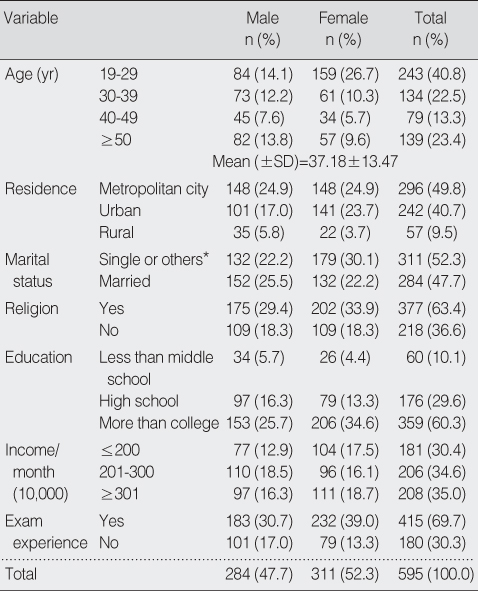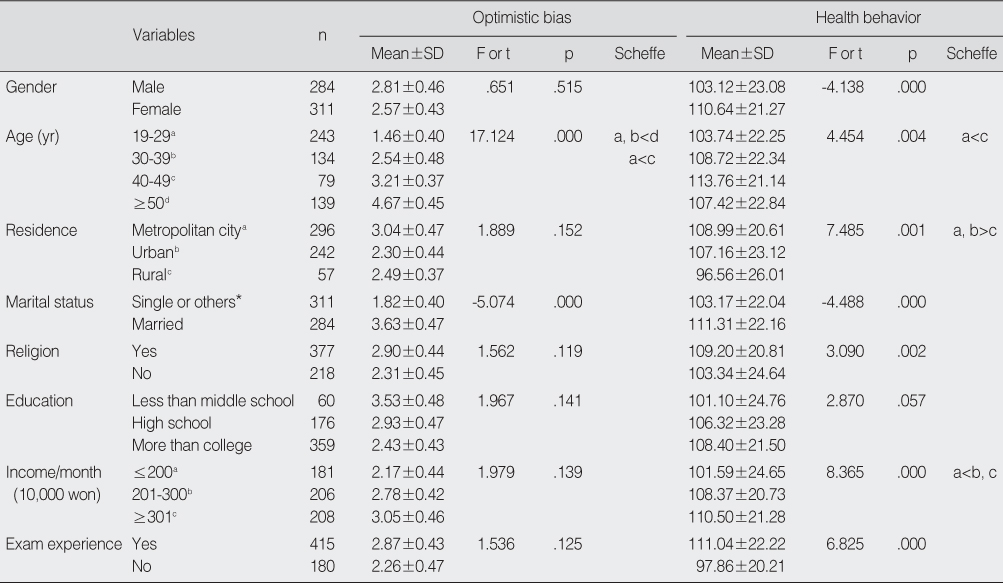Articles
- Page Path
- HOME > J Korean Acad Nurs > Volume 38(3); 2008 > Article
-
Original Article
- The Relationship between Optimistic Bias about Health Crisis and Health Behavior
- Su Ho Park, Sul Hee Lee, Eun Mi Ham
-
Journal of Korean Academy of Nursing 2008;38(3):403-409.
DOI: https://doi.org/10.4040/jkan.2008.38.3.403
Published online: June 30, 2008
1Researcher, National Cancer Control Research Institute, National Cancer Center, Goyang, Korea.
2Nurse, Konkuk University Hospital, Seoul, Korea.
3Professor, Department of Nursing, Konkuk University, Chungju, Korea.
- Address reprint requests to: Ham, Eun Mi. Department of Nursing, Konkuk University, 322 Danwol-dong, Chungju 380-701, Korea. Tel: 82-43-840-3958, Fax: 82-43-840-3958, hem2003@kku.ac.kr
Copyright © 2008 Korean Society of Nursing Science
Abstract
-
Purpose
- This study was performed to identify the relationship between optimistic bias about health crisis and health behavior of Korean adults in a crisis of health, and to prepare baseline data for developing a health education and promotion program.
-
Methods
- Study subjects were 595 adults aged from 19 to 64 who live in Korea. Data were collected through questionnaires administered by one interviewer. Descriptive statistics and Pearson's correlation coefficient were calculated using the SPSS program.
-
Results
- The average score for optimistic bias about health crisis was 2.69, and that for health behavior was 107.05. The optimistic bias about health crisis showed a significantly positive correlation with health behavior (r=.187, p=.000).
-
Conclusion
- To make our results more useful, it is necessary to identity the causal relationship between health attitudes as an explanatory variable and optimistic bias as an outcome variable. In addition, a relatively low score in optimistic bias from this research compared to other studies must be explained through further studies considering unique Korean cultural background. Moreover, research of the relationship between optimistic bias about health crisis and health behavior looking at people who don't have good health behaviors is needed.
- 1. Atkinson MJ, Wishart PM, Wasil BI, Robinson JW. The Self-Perception and Relationships Tool (S-PRT): A novel approach to the measurement of subjective health-related quality of life. Health and Quality of Life Outcomes. 2004;2:36. PubMedPMC
- 2. Barnoy S, Bar-Tal Y, Treister L. Effect of unrealistic optimism, perceived control over disease, and experience with female cancer on behavioral intentions of Israeli women to undergo screening tests. Cancer Nursing. 2003;26:363–369.ArticlePubMed
- 3. Buehler R, Messervey D, Griffin D. Collaborative planning and prediction: Does group discussion affect optimistic biases in time estimation? Organizational Behavior and Human Decision Processes. 2005;97:47–63.Article
- 4. Chang EC, Asakawa K. Cultural variations on optimistic and pessimistic bias for self versus a sibling: Is there evidence for self-enhancement in the West and for self-criticism in the East when the referent group is specified? Journal of Personality and Social Psychology. 2003;84:569–581.ArticlePubMed
- 5. Cho WJ. An empirical study on Korean adults perception of their health behavior. 1983;Seoul, Yonsei University. Unpublished doctoral dissertation.
- 6. Clarke VA, Lovegrove H, Williams A, Machperson M. Unrealistic optimism and the health belief model. Journal of Behavioral Medicine. 2000;23:367–376.ArticlePubMedPDF
- 7. Cohen DA, Scribner RA, Farley TA. A structural model behavior: A programatic approach to explain and influence health behaviors at the population level. Preventive Medicine. 2000;30:146–154.ArticlePubMed
- 8. Han AK, Cho DS. A study physiological parameters, health behavior of adults in Gyeonggi province area. Journal of Korean Academy of Nursing. 2001;31:631–640.
- 9. Han MJ. People's optimistic bias and the effectiveness of a health campaign. Journal of Korean Social Science. 1998;5:381–394.
- 10. Harris DM, Guten S. Health-protective behavior: An exploratory study. Journal of Health and Social Behavior. 1979;20:17–29.ArticlePubMed
- 11. Heine S, Lehman D. Culture variation in unrealistic optimism: Does the West feel more invulnerable than the East? Journal of Person and Social Psychology. 1995;68:595–607.
- 12. Kim BC, Choi YH, Choi MI. AIDS prevention campaign and optimistic bias: Self-esteem and a sense of control as social psychological factors. Journal of Korean Advertising Society. 2006;17(2):43–58.
- 13. Death by sex and age according to the 19 chapters classification. Korea National Statistical Office. 2005;12;Retrieved June 1, 2006. from http://www.kosis.kr.
- 14. Kos JM, Clarke VA. Is optimistic bias influenced by control of delay? Health Education Research. 2001;16:533–540.PubMed
- 15. Lee DS. A structural model development of health insensitivity. 2003;Seoul, Seoul National University. Unpublished doctoral dissertation.
- 16. Lin YC, Raghubir P. Gender difference in unrealistic optimism about marriage and divorce: Are men more optimistic and women more realistic? Personality and Social Psychology Bulletin. 2005;31:198–207.PubMed
- 17. Mikhail B. The health belief model: A review and critical evaluation of the model, research and practice. Advances in Nursing Science. 1981;4:65–82.ArticlePubMed
- 18. 2001 Korean national examination health and nutrition survey. Ministry of Health and Welfare. 2005;07 29 Retrieved May 20, 2006. from http://www.mohw.go.kr/user.tdf.
- 19. Perloff LS. Snyder CR, Ford C. Social comparison and illusions of invulnerability to negative life event. In: Coping with negative life events: Clinical and social psychological perspectives on negative life events. 1987;New York, Plenum Press. 217–242.
- 20. Perloff LS, Fetzer BK. Self-other judgements and perceived vulnerability to victimization. Journal of Person and Social Psychology. 1986;50:502–510.
- 21. Scheier MF, Matthews KA, Owens JF, Magovern GJ, Lefebvre RC, Abbott RA, et al. Dispositional optimism and recovery from coronary artery bypass surgery: The beneficial effects on physical and psychological well-being. Journal of Personality and Social Psychology. 1989;57:1024–1040.ArticlePubMed
- 22. Shapiro M, Han MJ. Thinking aloud about impersonal impact. 1994;In: Journalism and Mass Communication Conference; Atlanta, GA, Paper presented at the theory & methodology division of the Association for Education.
- 23. Song MS, Byeon YS, Lim KS, Oak JW. A study on health behavior in people at risk for a cerebrovascular accident. Journal of Korean Academy of Nursing. 2007;37:1091–1097.ArticlePubMedPDF
- 24. Stronegger WJ, Freidl W, Rasky E. Health behavior and risk behavior: Socioeconomic differences in an Austrian rural county. Social Science and Medicine. 1997;44:423–426.PubMed
- 25. Tennen H, Affleck G. The costs and benefits of optimistic explanations and dispositional optimism. Journal of Personality. 1987;55:376–393.PubMed
- 26. Weinstein ND. Unrealistic optimism about future life event. Journal of Personality and Social Psychology. 1980;39:806–820.Article
- 27. Weinstein ND, Marcus SE, Moser RP. Smokers' unrealistic optimism about their risk. Tobacco Control. 2005;14:55–59.ArticlePubMedPMC
- 28. Weinstein ND, Slovic P, Gibson G. Accuracy and optimism in smokers' belief about quitting. Nicotine & Tobacco Research. 2004;6:S375–S380.
- 29. Yi SE, Oh KS, Park YJ, Kim JA, Kim HS, Oh KO, et al. Structural equation model for the health behaviors of university students in Korea. Journal of Korean Academy of Nursing. 2004;34:903–912.ArticlePubMedPDF
REFERENCES
Figure & Data
REFERENCES
Citations

- Impact of public health communication for prevention and personal resilience at the time of crisis. A pilot study with psychophysiological and self-report measures
Carlotta Acconito, Laura Angioletti, Michela Balconi
Journal of Health Psychology.2025; 30(3): 498. CrossRef - Expanding the health belief model on dementia knowledge, fear, and preventive behaviors among older adults in Korea: a cross-sectional descriptive study
Jeong Eui Yun, Suyoung Choi
Journal of Korean Biological Nursing Science.2025; 27(1): 60. CrossRef - Factors influencing dementia preventive behaviors of older adults at high risk of dementia: Application of extended health belief model
So Hee Jung, Mee Ock Gu
Research in Community and Public Health Nursing.2024; 35: 22. CrossRef - Multiple Group Membership, Optimistic Bias, and Infection Risk in the Context of Emerging Infectious Diseases
Daniel Frings, Jane Wills, Susie Sykes, Kerry V. Wood, Ian P. Albery
European Journal of Health Psychology.2023; 30(3): 115. CrossRef - Knowledge and perception of cardiovascular disease risk among patients with rheumatoid arthritis
Sunjoo Boo, Hyunjin Oh, Erika S. Froelicher, Chang-Hee Suh, Xianwu Cheng
PLOS ONE.2017; 12(4): e0176291. CrossRef - Self‐perceived health versus actual cardiovascular disease risks
Young Ko, Sunjoo Boo
Japan Journal of Nursing Science.2016; 13(1): 65. CrossRef - The Effects of the Stroke on the Health Knowledge, Optimistic Bias and Health-Promoting Lifestyle in Middle-Aged Adults
Young-Ju Jeong, Jin-Hee Park
Journal of the Korea Academia-Industrial cooperation Society.2016; 17(9): 141. CrossRef - The Relationship between the Optimistic Bias about Cancer and Cancer Preventive Behavior of the Korean, Chinese, American, and Japanese Adult Residing in Korea
Sul Hee Lee, Eun Mi Ham
Journal of Korean Academy of Nursing.2010; 40(1): 52. CrossRef
General Characteristics of Subjects
*Separation, divorce, separation by death.
Optimistic Bias, Health Behavior according to General Characteristics (N=595)
*Separation, divorce, separation by death.
Score of Optimistic Bias, Health Behavior (N=595)
Health Behavior according to Optimistic Bias (N=595)
Correlation between Optimistic Bias and Health Behavior
*Separation, divorce, separation by death.
*Separation, divorce, separation by death.
 KSNS
KSNS
 E-SUBMISSION
E-SUBMISSION





 Cite
Cite

